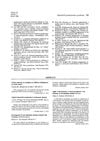 69 citations,
August 2008 in “Journal of The European Academy of Dermatology and Venereology”
69 citations,
August 2008 in “Journal of The European Academy of Dermatology and Venereology” Oral dutasteride and topical pimecrolimus can safely and effectively treat Frontal Fibrosing Alopecia, leading to significant hair regrowth.
[object Object]  53 citations,
June 2012 in “Annales d'Endocrinologie”
53 citations,
June 2012 in “Annales d'Endocrinologie” The document concludes that recognizing and properly diagnosing lipodystrophy syndromes is crucial for effective management and treatment.
 26 citations,
October 2007 in “Experimental Dermatology”
26 citations,
October 2007 in “Experimental Dermatology” L-Carnitine-L-tartrate may help hair grow and prevent hair loss.
 7 citations,
November 2014 in “Histochemistry and Cell Biology”
7 citations,
November 2014 in “Histochemistry and Cell Biology” The we/we wal/wal mice have defects in hair growth and skin layer formation, causing hair loss, useful for understanding alopecia.
 3 citations,
January 2008 in “Actas dermo-sifiliográficas/Actas dermo-sifiliográficas”
3 citations,
January 2008 in “Actas dermo-sifiliográficas/Actas dermo-sifiliográficas” Early diagnosis and treatment of Hidradenitis Suppurativa are important to prevent serious physical and mental effects.
 August 2023 in “International journal of research in dermatology”
August 2023 in “International journal of research in dermatology” Janus kinase inhibitors are effective and generally safe for treating hair loss in adults with alopecia areata.
 14 citations,
July 2010 in “British Journal of Dermatology”
14 citations,
July 2010 in “British Journal of Dermatology” Estrogen and prolactin may play bigger roles in female hair loss than previously thought.
 187 citations,
December 2005 in “Experimental Dermatology”
187 citations,
December 2005 in “Experimental Dermatology” Estrogens can improve skin aging but carry risks; more research is needed on safer treatments.
 223 citations,
September 2018 in “Rheumatology”
223 citations,
September 2018 in “Rheumatology” JAK inhibitors are effective in treating various immune-related diseases, not just rheumatoid arthritis.
 120 citations,
February 2009 in “Apoptosis”
120 citations,
February 2009 in “Apoptosis” Understanding how cells die in the skin is important for treating skin diseases and preventing hair loss.
 86 citations,
October 2005 in “Experimental Dermatology”
86 citations,
October 2005 in “Experimental Dermatology” The Foxn1 gene mutation causes hairlessness and immune system issues, and understanding it could lead to hair growth disorder treatments.
 56 citations,
July 2005 in “Experimental Dermatology”
56 citations,
July 2005 in “Experimental Dermatology” Injected human hair follicle cells can create new, small hair follicles in skin cultures.
 28 citations,
November 2014 in “Current Diabetes Reports”
28 citations,
November 2014 in “Current Diabetes Reports” Girls with PCOS during adolescence have a higher risk of developing type 2 diabetes, and early treatment can help manage this risk.
 28 citations,
September 2014 in “Journal of Clinical Oncology”
28 citations,
September 2014 in “Journal of Clinical Oncology” Men with baldness at the front and top of their head at age 45 may have a higher risk of aggressive prostate cancer.
[object Object]  15 citations,
October 2016 in “Journal of The European Academy of Dermatology and Venereology”
15 citations,
October 2016 in “Journal of The European Academy of Dermatology and Venereology” People with hair loss have worse cholesterol levels, possibly linking hair loss to heart problems.
 8 citations,
March 2019 in “Open Biology”
8 citations,
March 2019 in “Open Biology” The document concludes that regenerating functional ectodermal organs like teeth and hair is promising for future therapies.
 January 1987 in “Side effects of drugs annual”
January 1987 in “Side effects of drugs annual” Some cosmetics and dermatological drugs can cause allergic reactions and side effects, like skin irritation and systemic issues.
 March 1988 in “Journal of The American Academy of Dermatology”
March 1988 in “Journal of The American Academy of Dermatology” The document concludes that misdiagnosis in skin conditions is common, certain treatments can cause allergic reactions, and some skin symptoms are linked to leukemia, especially in certain Japanese regions.
 August 2023 in “The Indonesian Biomedical Journal”
August 2023 in “The Indonesian Biomedical Journal” Rosemary essential oil improved hair growth and thickness in UVB-exposed mice.
 2 citations,
August 2017 in “British Journal of Dermatology”
2 citations,
August 2017 in “British Journal of Dermatology” Hair loss in Cronkhite-Canada syndrome may be due to an autoimmune response.
 April 2020 in “International journal of clinical and diagnostic pathology”
April 2020 in “International journal of clinical and diagnostic pathology” COX-2 and Bcl-2 proteins are involved in Lichen Planus.
 109 citations,
October 2007 in “Journal of pineal research”
109 citations,
October 2007 in “Journal of pineal research” Melatonin helps regulate hair growth and protects the hair follicle from stress.
 59 citations,
June 2022 in “Frontiers in medicine”
59 citations,
June 2022 in “Frontiers in medicine” There are still challenges in diagnosing and treating chronic skin diseases, but there is hope for future improvements.
 29 citations,
November 2013 in “Expert Review of Dermatology”
29 citations,
November 2013 in “Expert Review of Dermatology” Sensitive skin often causes discomfort, affects many people, especially women and older adults, and should be managed with careful product selection.
 5 citations,
February 2010 in “Expert Review of Dermatology”
5 citations,
February 2010 in “Expert Review of Dermatology” Treating both the mind and skin together, especially by managing stress, can greatly improve outcomes for skin disorders linked to psychological issues.
 5 citations,
April 2007 in “Expert Review of Dermatology”
5 citations,
April 2007 in “Expert Review of Dermatology” Dermatologists can help detect and manage eating disorders by recognizing skin changes.
 4 citations,
September 2014 in “Elsevier eBooks”
4 citations,
September 2014 in “Elsevier eBooks” Use some skin medications with caution during pregnancy; avoid strong steroids, certain eczema treatments, and systemic retinoids, but many topical treatments and nasal sprays are safe.
 3 citations,
July 2011 in “Expert Review of Dermatology”
3 citations,
July 2011 in “Expert Review of Dermatology” Effective treatments for excessive hair growth in women include creams, laser therapy, and medications, with the choice depending on individual needs and potential side effects.
 2 citations,
August 2016 in “British Journal of Clinical Pharmacology”
2 citations,
August 2016 in “British Journal of Clinical Pharmacology” The document concludes that women should not use 5-alpha-reductase inhibitors due to the risk of birth defects and limited effectiveness.
 1 citations,
January 1989 in “Journal of dermatological treatment”
1 citations,
January 1989 in “Journal of dermatological treatment” Azelaic acid may help treat acne by killing bacteria, reducing inflammation, and preventing clogged pores.






























